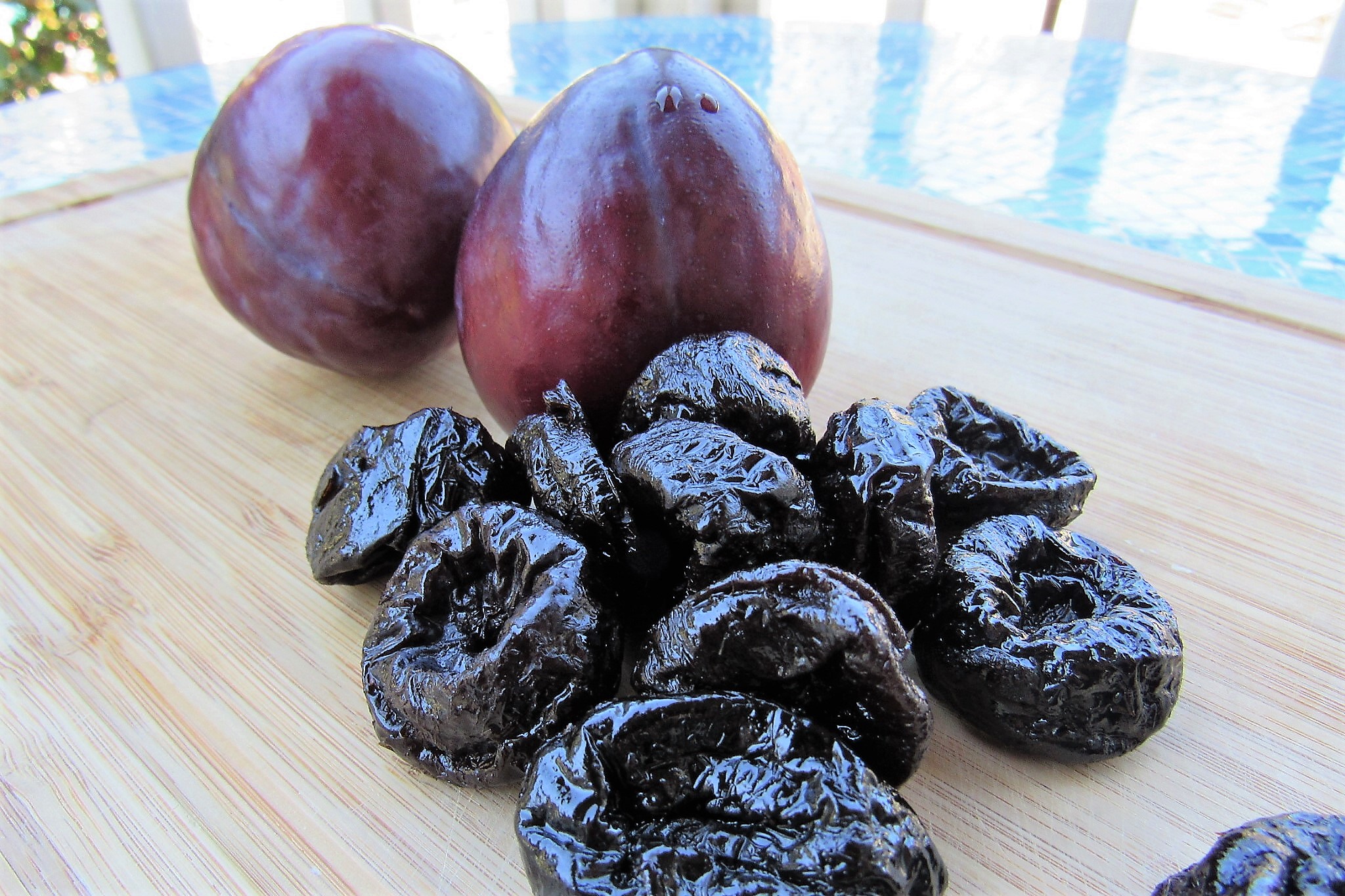Some foods don’t have a sexy name or an enticing appearance but such foods, like prunes, should not be underestimated for their tasty flavor and notable health benefits. My 1 ½ year old daughter frequently asks for them by name at snack time! While they may have a reputation for helping people improve regularity, they have several other worthwhile benefits that may actually surprise you!
Bone Health
While many look to rich sources of calcium and vitamin D to maintain bone health (which is important!), research is suggesting that a variety of nutrients in prunes synergistically work together to help improve bone mineral density. These nutrients include magnesium, vitamin K, boron, copper and potassium. Some studies, like this one, show that prunes may play a significant role in reducing bone turnover (loss of bone density) in postmenopausal women AND may even increase bone density in the spine and forearm. While these women were eating about 10 prunes a day, this research is quite interesting and shows that a consistent intake of dried plums may actually have a monumental impact in the area of osteoporosis prevention!
Heart Health
Sadly, heart disease continues to be the leading cause of death and mortality in the US. BUT, there are so many preventable steps that you and your family can take to keep your heart healthy, including eating real foods, especially those naturally high in fiber. About 60% of the dietary fiber in prunes is pectin, a type of soluble fiber that may lower blood cholesterol levels. Prunes also contain a specific type of antioxidants called phenolic compounds which have been shown to help lower the risk of heart disease and prevent oxidation of LDL cholesterol.
Other research from the Journal of Ayub of Medical College suggests that 3-6 prunes a day may help lower blood pressure. Not bad for a few little ‘ole prunes!
Digestive Health
Probably most well known for their efficiency in improving constipation and irregularity, prunes contain a combination of fiber and natural sugars (including sorbitol) that have been shown to help swiftly move waste through the colon.
Many individuals naturally think that they need a fiber supplement for constipation or irregularity. Some of the most popular being fiber “gummies”, BUT, have you read the ingredients in those things!? Many are filled with sugar (AND calories), dyes and a lot of unnecessary, chemical (manufactured) ingredients. Why spend money on processed supplements and products when real food has been proven to be just as good, if not better. I believe that real food should always be our first response and appropriate, quality supplements can be a back-up.
Research has shown that prunes are actually more effective than psyllium (a beneficial type of fiber) in helping improve regularity. There is also some promising research that shows prunes may even help reduce the risk of colon cancer.
Nutrients in 1 Serving: 4-5 Prunes (40 grams)
- ~100 calories
- 3 grams fiber* (find out all you need to know about fiber recommendations)
- 290mg potassium (9%), involved in nervous system, muscle function and blood pressure regulation
- 32% of Vitamin K, important for strong bones and blood clotting
The Dietary Guidelines for Americans recommends that individuals should strive to meet nutrient recommendations from foods alone, rather than relying on supplements and over-the-counter vitamins. This means we need to be intentional about making every bite count and loading up every meal with nutrient dense foods.
Do prunes have too much sugar?
Despite their sweet, succulent taste, 1 serving of prunes actually has a low glycemic index and low glycemic load, according to the University of Sydney, Australia. While it is generally wise to pair fruit, dried, fresh or frozen, with healthy fat or protein for good blood sugar control, a moderate serving of prunes can be incorporated in a variety of ways into your meals without concern of an excessive blood sugar response.
Are all prunes the same?
Prunes are naturally sweet and therefore usually do not have any added sugars in the ingredient list. Often, brands add potassium sorbate, a preservative or sunflower oil, to prevent pieces from sticking together. However, you can find preservative/oil free prunes (Trader Joe’s Sorbate Free Prunes, Sunsweet D’Noir Prunes). Those without any potassium sorbate have a less sticky texture and are more similar to a raisin or date in chewiness.
How can you include prunes in your meals?
- Fruit snack replacement for kids– these sweet and chewy bits are the perfect substitution for those sugar laden fruit snacks filled with artificial colorings and flavors
- Sweet and chewy topping– add to yogurt or oatmeal or even as a salad topping
- Substitution for fat or refined sugar in baked goods
- Granola bar ingredient
- Natural sweetener for oatmeal or yogurt- pureed prunes
REFERENCES
1. Sunsweet Prunes, https://www.sunsweet.com/
2. California Dried Plums, http://www.californiadriedplums.org/
3. 2015-2020 Dietary Guidelines for Americans, https://health.gov/dietaryguidelines/2015/guidelines/
4. Ahmed T1, Sadia H, Batool S, Janjua A, Shuja F. (2010). Use of prunes as a control of hypertension. J Ayub Med Coll Abbottabad.; 22(1):28-31. Retrieved from https://www.ncbi.nlm.nih.gov/pubmed/21409897
5. Hooshmand S1, Chai SC, Saadat RL, Payton ME, Brummel-Smith K, Arjmandi BH. (2011). Comparative effects of dried plum and dried apple on bone in postmenopausal women. Br J Nutr., 106(6):923-30. doi: 10.1017/S000711451100119X.
6. M. Stacewicz-Sapuntzakis. (2013). Dried Plums and Their Products: Composition and Health Effects–An Updated Review. Critical Reviews In Food Science And Nutrition Vol. 53, Iss. 12,2013. Retrieved from http://www.tandfonline.com/doi/abs/10.1080/10408398.2011.563880?journalCode=bfsn20
DISCLOSURE
This post contains affiliate links. If you purchase a product through this link, your cost will be the same but Healthy Inspiration will receive a small commission to help with the operating costs of this blog. Thank you for your support!

